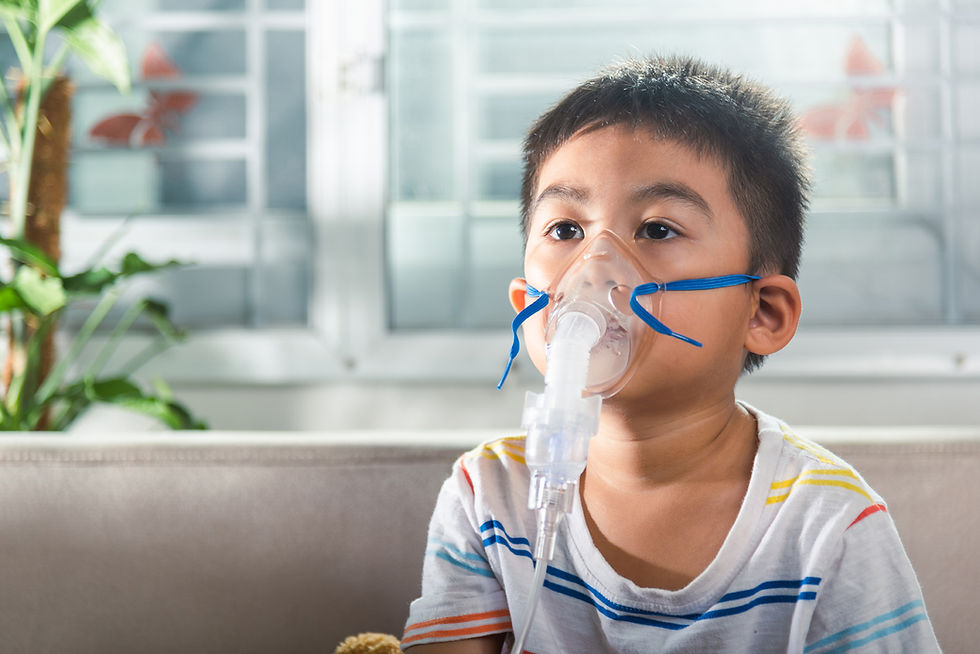Nebulisation and Suctioning
- Jul 9, 2025
- 3 min read
Updated: Jul 16, 2025
Helping Your Child Breathe with Ease

Breathing difficulties can be especially distressing for young children, and for the parents caring for them. Whether your child is wheezing, coughing or struggling to sleep due to congestion, these symptoms can quickly become overwhelming. At Joyful Seeds Paediatric & Development Clinic in Bukit Timah, we offer nebulisation and suctioning services in a calm, child-friendly setting to support your little one’s recovery and restore comfort to your day.
With the thoughtful guidance of Dr Charmaine Teo and Dr Martha Liu, our care is always delivered with kindness, patience and clarity.
What Are Nebulisation and Suctioning
Nebulisation
Nebulisation turns liquid medicine into a fine mist that your child can breathe in through a soft mask. This helps to open up their airways, reduce inflammation and make breathing easier. It is especially helpful in managing:
Asthma
Bronchiolitis
Croup
Wheezing caused by colds or other infections
Suctioning
Suctioning helps clear excess mucus from your child’s nose or throat using a gentle suction device. It is particularly useful for infants and toddlers who are too young to clear their own airways, and may be struggling to breathe, feed or settle due to nasal congestion.
Both treatments are safe, effective and often bring noticeable relief in a short amount of time.
When You Might Need These Treatments
Our paediatricians may recommend nebulisation or suctioning if your child is showing signs of respiratory discomfort. Some symptoms to look out for include:
Fast or noisy breathing
You may notice your child breathing more quickly than usual, or hear wheezing or rattling sounds during each breath.
Wheezing or chest tightness
This can sound like a whistling noise when your child breathes out, and may come with signs of discomfort or anxiety.
Trouble feeding or sleeping due to a blocked nose
Babies and toddlers may pause during feeds, fuss at the breast or bottle, or wake frequently due to nasal congestion.
Ongoing coughing that is disturbing rest or feeding
A persistent cough can prevent your child from settling down, cause vomiting, or lead to irritability from poor sleep.
Visible discomfort when trying to breathe or settle
Your child may flare their nostrils, pull in their chest muscles when breathing, or appear more tired and unsettled than usual.
These signs are your child’s way of telling you they need support. Early care can bring comfort and prevent symptoms from escalating.
What to Expect at Joyful Seeds
When you arrive at Joyful Seeds, our team will take time to understand what your child has been experiencing. We begin with a full medical assessment and discuss any recent symptoms or changes you’ve noticed.
If nebulisation or suctioning is recommended, here’s what the process will look like:
We explain the purpose of the treatment and what to expect
Your child stays close to you throughout the procedure
The treatment is delivered slowly and calmly, without rush
We monitor your child’s comfort and breathing response during and after
You’ll receive guidance on what to observe at home and when to return
Everything we do is focused on helping your child feel safe, and helping you feel reassured.
Why Families Choose Our Care
We understand that caring for a sick child can feel overwhelming. Our goal is to ease that burden by creating a clinic experience that is calm, caring and clear.
Families often tell us they appreciate:
How comfortable and well-prepared they feel during the visit
The peaceful setting that puts children at ease
The clear explanations and thoughtful follow-up care
Being supported by doctors who listen closely and understand their concerns
Sometimes, it is the small, steady support that brings the greatest relief.
Here When You Need to Act Quickly
Breathing concerns can come on quickly, especially in young children. Having access to timely, professional care can make a big difference. At Joyful Seeds, we’re here to support your child’s comfort, recovery and wellbeing, at any stage of their respiratory illness.



